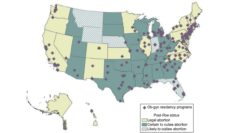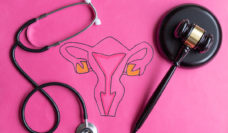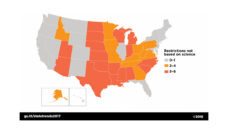Public Health Post: What is isotretinoin and what is it used to treat in dermatology?
Jane Grant-Kels: Isotretinoin, sometimes referred to as Accutane, is a prescription medication for severe acne. It’s a highly effective acne treatment and an important tool for dermatologists. It’s the closest thing we have to a cure for acne.
A lot of people get mild acne, and the lesions come and go. But some people get severe acne: they often affect a young and vulnerable population who are entering early adulthood, becoming sexually aware, and starting to want to date. Having marring skin rashes on your face is a very difficult problem for people, their self-worth, their ego, and their identity.
Acne is not a disease that should be taken lightly. You should never underestimate how it impacts the social and psychological development of a person.
What side effects or key considerations come with an isotretinoin prescription?
Isotretinoin is teratogenic, meaning that it causes a substantial risk of life-threatening malformations in a developing fetus. If a person is on isotretinoin and gets pregnant, abortion is one of the options that you must consider because of the relatively high risk of fetal abnormality. Although there isn’t a 100% chance that a patient is going to have a child with a birth defect, the defects are severe, and the incidence is quite high.
We don’t want patients on isotretinoin to become pregnant. Since 2006, the FDA has run iPLEDGE, a mandatory pregnancy prevention program for patients taking isotretinoin. The program tries to ensure that patients use at least two types of birth control, such as condoms, oral birth control pills, or an IUD, and patients are required to submit negative pregnancy tests every month before receiving their medication. If a patient on isotretinoin gets pregnant, that is reported to the iPLEDGE program.
Are there alternative treatment options for pregnancy-capable people with severe acne? Are these treatments being used more frequently since the Dobbs decision?
There aren’t great options. Most other options like laser treatment or light therapy are very expensive and, for the most part, are not covered by insurance. From experience, I would say that they’re not as good as isotretinoin. Isotretinoin is a very useful tool that, if taken out of our toolbox, would be devastating for patients with severe acne.
How has the overturning of Roe v. Wade impacted the prescription of isotretinoin?
When a patient is prescribed isotretinoin, dermatologists talk to them about the possibility that, if they get pregnant, they might need an abortion. When Roe v. Wade was overturned, that option was taken off the table in many states. I work in Connecticut, and that option is still available for my patients, but if a patient lives in Texas or Louisiana, and they are poor or have a limited ability to travel, it can be very problematic. Even if a woman has the knowledge, the means, and the transportation to get to another state, wait times have gone up at abortion clinics in surrounding states, making it harder to access abortion care.
In states where abortion is banned or limited to early stages of pregnancy, will doctors refrain from prescribing isotretinoin due to these new laws?
Isotretinoin remains vital for severe acne treatment, and I’ve yet to encounter a dermatologist who stopped using it due to the change in law. From what I’ve heard, most colleagues continue to use the medication but now counsel patients more strictly. The iPLEDGE program accepts abstinence as a valid form of birth control, but I think many dermatologists in states where abortion is highly restricted are now worried about accepting abstinence as a form of contraception.
No one should get in between me and my patient, and my patient’s autonomy to choose or not choose a treatment. This law has done that, and I think it has created an ethical dilemma for those of us who prescribe isotretinoin. No one asked physicians or specialists: “What would be the collateral consequences of overturning Roe v. Wade?” I think there should be exceptions for patients who need this medication, but I don’t foresee that happening.
Photo provided
This interview has been edited for length and clarity














